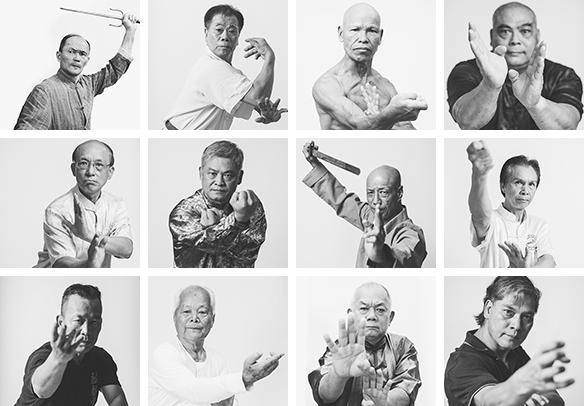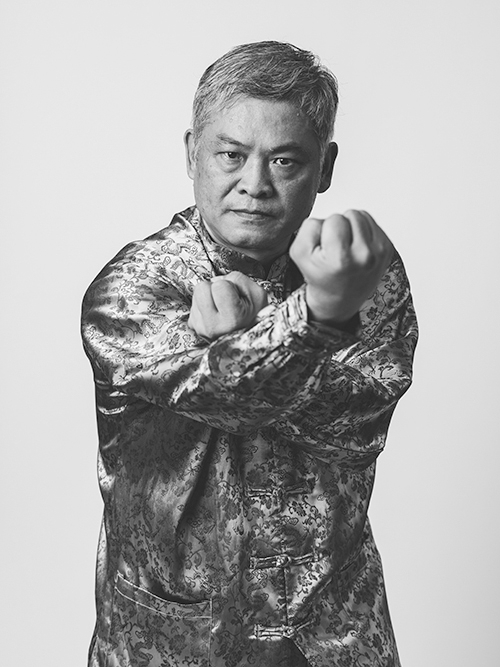Cheng Wai Yu, a native of Sinhui county in Guangdong province, was born in Hong Kong in 1960. He now lives in Dongguan. He used to run a factory but now runs his own martial art school and is a full-time teacher.
鄭偉儒,1960年香港出生,籍貫廣東新會。現常居廣東東莞。過去經營工廠,現時全職開設武館授武。
Cheng Wai Yu developed a strong interest in the martial arts when he was a child. At one point he even fell in love with professional wrestling through television. During his childhood, together with his friends, they often imitated kung fu film stars. In 1974 at the age of fourteen he started work at a plastic factory. Even though he wanted to learn kung fu, as an apprentice he had a low income and had to wait for two years until his salary rose. Due to lack of introduction, for a time he drifted from one martial art school to another to observe how people teach and practice, changing schools whenever he felt like it. A year or so later, he ran into an old school friend who told him about Pak Mei master Cheung Bing Fat’s studio in Kwun Tong Yue Man Square (Fu Yan Street Fu Yan Building fourth floor Block L). Even though Cheng Wai Yu knew little about Pak Mei style kung fu, he followed his friend to Cheng Bing Fat’s school. According to Cheng Wai Yu’s description, Cheung Bing Fat had a small stature but glinting eyes that were full of spirit. Cheung Bing Fat encouraged Cheng Wai Yu to learn, and said that his tall and strong physique was ideal for martial arts, and so Cheng Wai Yu decided to learn Pak Mei. At one hundred Hong Kong dollars per month, Cheung sifu’s fees were almost double of what other martial art teachers were charging, and Cheng Wai Yu had to save money to pay for his martial art classes.
鄭偉儒自小喜愛武術,甚至曾迷上電視播放的摔角節目,常常跟朋友玩耍,一起模仿武俠片的武打名星。1974年鄭偉儒十四歲,到社會工作,當塑膠製品學徒。雖然他想學功夫,但由初當學徒的收入不高,只有等待兩年後收入增加後再作打算。由於沒有人引薦,鄭偉儒有段時間只能隨意到不同的武館,觀察不同的師傅和他們的徒弟練功,感覺不合適就離開。一年多後,有次在街上偶遇一位舊同學,談起正跟隨觀塘裕民坊(輔仁街輔仁大廈4樓L座)的白眉派張炳發(1938年至1989年)師傅習武。雖然鄭偉儒不了解白眉派功夫,但亦跟朋友到張炳發的武館。鄭偉儒形容張炳發的身型瘦小,但雙眼炯炯有神。張炳發鼓勵鄭偉儒,身材高大又扎實,很適合習武,於是鄭偉儒下決心學習白眉派功夫。當時張師傅收學費比別人貴一倍,每月學費一百元,鄭偉儒需節儉省用才夠交學費。
On 2nd March 1977 Cheng Wai Yu began formal instruction with Master Cheung Bing Fat. There were over ten other students. They trained five times a week with each session lasting around two hours. At first he found it difficult to grasp the principles of Pak Mei kung fu, but seeing the force generated in his martial art elder brothers’ movements he was determined to succeed. After half a year, his master complimented his talent and invited him to live in the school. For seven years he lived there, dividing his time between his regular job and assisting his master to instruct beginners. Even though Cheng Wai Yu never went through a formal initiation ceremony he was designated as his successor. In 1986 Cheung Bing Fat moved to Sai Kung and stopped giving lessons. His studio was used as tit daa clinic only and in January 1989 he passed away.
1977年三月二日鄭偉儒正式跟張炳發學功夫,當時有十多位師兄弟一起練功,一星期練五天,每次兩小時。他最初不了解白眉派功夫,但每當見到師兄們拳腳有勁,他就很想學成。最終半年後,師傅讚賞他有天份,讓他在武館居住下來,一直住了七年之久,同時兼顧工作,期間又當助教協助師傅教功夫,教初學的師弟。鄭偉儒雖然沒有跟張炳發行拜師儀式,但師傅明言讓他做衣缽傳人。張炳發1986年搬到西貢居住,不再授徒,武館只經營跌打,於1989年一月過世。
In the early 90s factories in Hong Kong began to move to Mainland China, mostly to Dongguan and Shenzhen. In 1993 Cheng Wai Yu also moved his factory to Dongguan. His factory manufactured plastic models and products, and most of the workers were young people. Every evening Cheng Wai Yu practiced kung fu in the dormitory, which attracted several young people to train with him. His original intent was merely to improve his workers’ physical condition, but this was in fact the beginning of the repatriation of Southern Chinese martial arts to Mainland China. In 2010 Cheng Wai Yu formally opened his first martial art school in China and has since opened other branches. He now has over one hundred students. In 2004 he founded Global Pak Mei Martial Arts Association and continues to serve as its president.
一九九零年代初,香港的工廠開始遷移到中國大陸,集中在東莞以及深圳。1993年,鄭偉儒把香港開設的工廠搬遷到東莞。工廠從事製作塑膠模具、塑膠製品,當時的工人大部份是年輕人。鄭偉儒每晚都會在工廠的宿舍練功夫,吸引了幾位年輕學徒一起練,見的為了鍛練體魄,但實際上南方傳統武術回流國內了。2010年鄭偉儒正式開設武館,至今已經開設了分館,現在已經教授超過一百位徒弟了。2004年成立全球白眉武術總會及現任主席。
Cheng Wai Yu believes that Pak Mei’s future development must have tradition as its basis and not lean too heavily on innovation. He said, “Pak Mei is a well developed martial art system. As a lineage holder it is my responsibility to focus attention on research and deepening my own understanding, rather than creating new forms or sequences, which will only lead to the kung fu style becoming watered down and losing its essence. Whether or not [a] kung fu [style] continues to grow depends on both dissemination and inheritance. Dissemination may be measured by numbers, to attract as many followers as possible, thus it is enough to teach selected materials from Pak Mei’s twenty-four sets to these students. Inheritance, on the other hand, places a much higher demand. Beside passing down all the empty-hand and weapon sets, as well as all the training methods, without reservation to the disciples, the master must also observe and cultivate the disciple’s virtue and inner qualities. In this day and age there is a lot of pressure on everyone, so it is no easy matter to inherit and pass down our kung fu legacy.”
鄭偉儒認為不管以何種方式推動白眉派發展,都必須尊重傳統,不宜過於創新:「白眉派已經是一門系統化的功夫,作為傳人必須深入研究及發掘為重點,而不是胡亂創編與膚淺化。功夫能否發揚光大,視乎傳播和傳承。傳播以數量而言,讓很多人學習則可,因此只需要挑選白眉派二十四套拳內其中一部份去廣泛教授已達到目的。至於傳承的要求高得多了,師傅除了必須將所有拳術、器械、練功方式等毫不保留地傳給徒弟,還需要考察徒弟的品德及資質。現代社會生活壓力大,要一輩子負起傳承責任談何容易!





